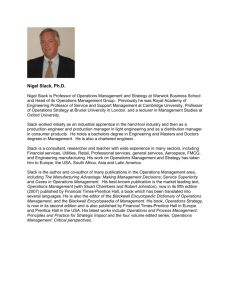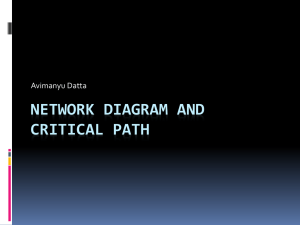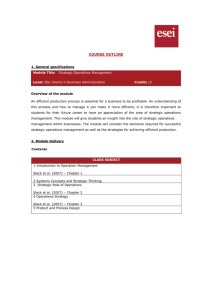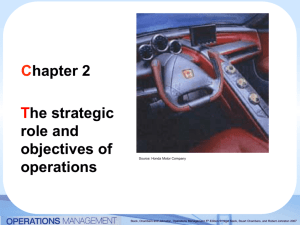FTA Operations Management - Staffordshire University
advertisement
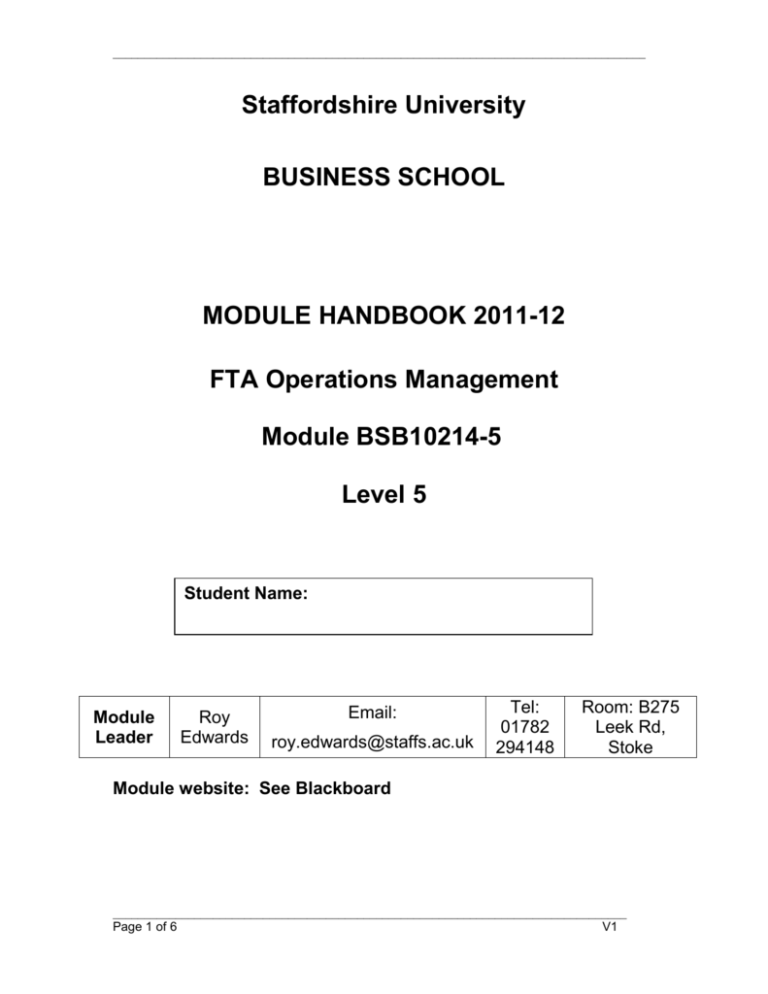
_____________________________________________________________________________________ Staffordshire University BUSINESS SCHOOL MODULE HANDBOOK 2011-12 FTA Operations Management Module BSB10214-5 Level 5 Student Name: Module Leader Roy Edwards Email: roy.edwards@staffs.ac.uk Tel: 01782 294148 Room: B275 Leek Rd, Stoke Module website: See Blackboard __________________________________________________________________________________ Page 1 of 6 V1 _____________________________________________________________________________________ Academic and Vocational Rationale This module is designed to develop an integrated understanding of how operations managers deliver value to the customer through operational activities. A range of theoretical concepts & models will be utilized to develop this integrated framework. Operations management is developed from both the perspective of the organisation and the customer. The module will provide a framework within which customer value can be understood, delivered, managed and satisfied. The management of customer value will need to consider the challenges of globalisation, social responsibility, how to manage and harness knowledge and technological change. Learning Outcomes 1. DEMONSTRATE KNOWLEDGE AND UNDERSTANDING OF THE CONCEPTS AND PRINCIPLES OF OPERATIONS IN AN ORGANISATION Knowledge & Understanding 2. EFFECTIVELY COMMUNICATE INFORMATION AND IDEAS IN VERBAL or NON-VERBAL FORMS Communication 3. EVALUATE AND APPLY UNDERLYING CONCEPTS AND PRINCIPLES OF OPERATIONS IN AN ORGANISATIONAL CONTEXT Analysis Teaching and Learning Strategies A wide range of teaching and learning strategies and activities will be used within this module. For example, case studies, group work, mini-presentations, discussions, reading learning materials and texts and using the module website etc. Students will be developing the skills and confidence necessary for their understanding and application of subject knowledge through these activities. The learning strategy for the module requires students to commit 150 learning hours (including assessment) of this there will an intensive 12 hours of class support and 138 hours of independent and self directed study. __________________________________________________________________________________ Page 2 of 6 V1 _____________________________________________________________________________________ Extensive learning support material will be provided on Blackboard for the module. The lecture / tutorial pattern may vary with some activities taking place in workshop groups. Module Outline Content The study of operations is split into 6 areas of study which are separated into 6 sessions with each session being subdivided into more specifically defined topic areas Understanding and defining the role of Operations Session 1 effective operations management the activities of operations management the strategic role of operations The design of products and services Session 2 Session 3 Key text Chapter 1 2 3 Key text Chapter the volume variety effect on design from concept to specification. 4 5 Planning and control of resources Key text Chapter capacity management inventory control lean production supply networks 11 12 15 13 Key text Chapter Workforce management and job design Session 4 Session 5 the design of jobs behavioral approaches to job design. Operations improvement 9 9 Key text chapter __________________________________________________________________________________ Page 3 of 6 V1 _____________________________________________________________________________________ measuring and improving performance quality management and excellence models The operations challenge Session 6 globalisation social responsibility environmental responsibility 17 18 Key text chapter 21 21 21 Assessment Instructions to candidates: Section A 27 Multiple choice questions @ 2% each 6 Yes/No questions @ 1% each = 54% = 6% Section B 5 Short answer questions @ 8% each = 40% You should answer all questions Section B – Short answer questions (40%) Section B of the examination paper will contain only 5 questions. These questions will be selected, by us, from the pre-published list of 8 possible questions given below. You will be required to write answers to all 5 of these questions. You will NOT KNOW WHICH 5 questions have been selected for the paper until you sit the exam. It is expected that your response to each question would be no more than 150 words, This exam paper has the requisite spaced lines for each of the written answers. Only in exceptional circumstances will additional answer books be accepted and these should be clearly marked in the usual way with your student name and number. You will NOT be allowed to take material, notes, articles or books into the examination with you. Please note that higher marks will be given where the exam paper as a whole reflects: Independent thought and ability to apply operations concepts to practical effect. A structured approach that utilises appropriate terminology and relevant models and frameworks where necessary. A good balance between the practical and theoretical aspects. Accuracy and clarity of style in presenting answers. This is a closed book examination and Staffordshire University regulations for examinations apply __________________________________________________________________________________ Page 4 of 6 V1 _____________________________________________________________________________________ Reading & Resources Key Texts (expect to buy): The following texts give a good overview of most of the topic areas covered in the first semester and are key texts for this module. The module core text is Slack N, Chambers S & Johnson R (2010), Operations Management, 6th Edition, Prentice-Hall. Nigel Slack text website An introduction to operations management by Nigel Slack “Operations Management is very important to all organisations. Operations is around as everywhere, everything you buy in shops has been made, every service that your experience has been created from the radio station you listen to the restaurants you frequent and the public transport you use. It all comes courtesy of Operations Management. Operations Management is really exciting it can make or break so many different companies. Most disasters you hear about it on TV are because people got the operations wrong - most successes you read about is because the organisation has got a really good operating model. Operations Management is also challenging it poses some really interesting questions of today like should you outsource parts of your business? – What are the ethics of using suppliers from third world? Hope you find it interesting - It will certainly be useful!!” See Nigel Slack's Introduction to operations and his text Meet the Author Other supporting texts are Heizer J. & Render B. (2008), Operations Management, 9th Edition. Prentice Hall, (ISBN 10 013 813454-5) __________________________________________________________________________________ Page 5 of 6 V1 _____________________________________________________________________________________ Johnston R. & Clark P. (2008). Service Operations Management. 3rd Edition. FT Prentice Hall. (ISBN 978 14058 4732 2) Johnston & Clark text website __________________________________________________________________________________ Page 6 of 6 V1
